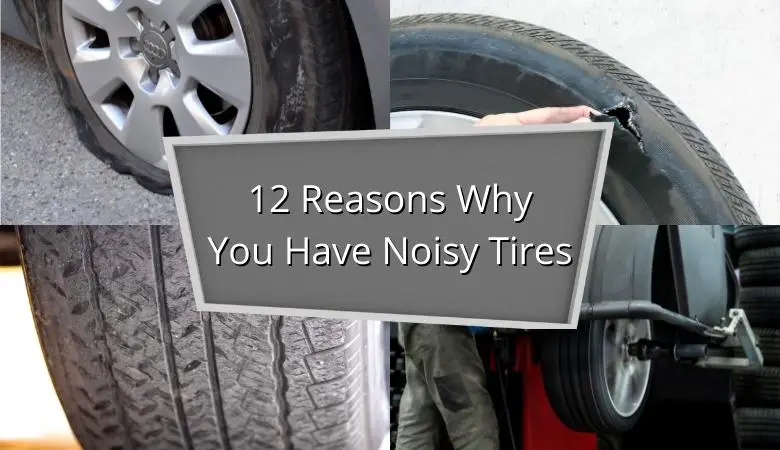One of the most annoying things to hear when driving is your tires screeching or just sounding a lot in general. While it may not be a big problem that directly affects your car, it can certainly make you uneasy, especially if you’re not sure why they’re making noise in the first place.
Noisy tires are frustrating, and they can be dangerous as well. It’s important to address these concerns before they cause an accident or become a safety hazard that may lead to costly repairs.
A little bit of sleuthing can go a long way toward determining why your tires are noisy, as well as how to fix the problem.
Here are 12 potential reasons why your tires might be making noise and what you can do about it so that the problem goes away quickly and permanently.
1. Overinflated Tires
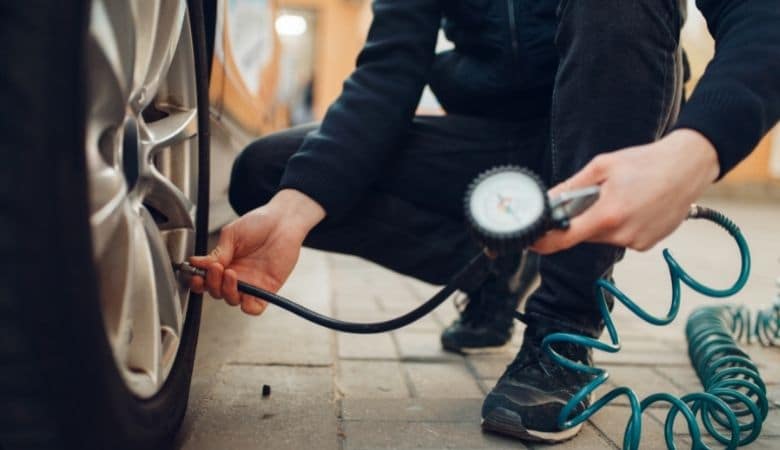
Every tire has a maximum amount of air pressure it can hold before it runs too high to be considered safe.
While most modern cars will have a sticker somewhere on them, often on the inside of the door jamb, with their specific pressure, you can check your owner’s manual or an online source like TireRack to see your vehicle’s recommended tire pressure.
It can also result in a decline in fuel efficiency. To make sure your tires are properly inflated, check out our tire pressure guide for details on how much air should be in your tires for both hot and cold weather.
If you’re experiencing noise from overinflated tires, bring them down to recommended levels by pressing the tire valve needle to let the air out, then add the correct amount of air by using a pump or compressor.
Always follow specific guidelines from your vehicle manufacturer to ensure that you don’t cause damage when reinflating; consult your owner’s manual if needed.
2. Underinflated Tires
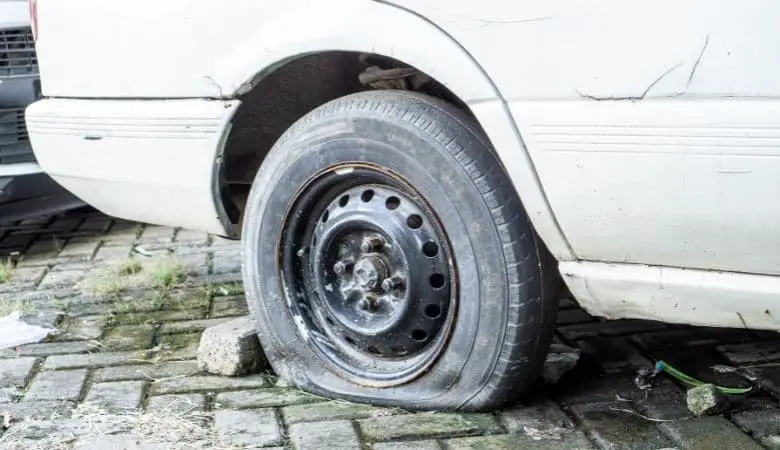
Underinflated tires are louder than they should be. This can be easily fixed with a tire gauge.
Underinflated tires will decrease gas mileage, cause increased wear and tear, and increase load on your suspension—which isn’t good for anything. If your treads are worn down significantly, it might even lead to dangerous blowouts that can send you skidding off of highways or around corners in bad weather.
Even if your tires are fine but just aren’t inflated correctly, underinflation can reduce performance and fuel economy by as much as 4%. It doesn’t take much to check inflation either; whether you have a manual or an automatic car, all it takes is five minutes at most.
Just find out what pressure your vehicle needs from its owner’s manual or manufacturer and make sure that’s what gets pumped up.
3. Bumpy Road

Sometimes a road will be bumpy, causing your car to shake slightly. This is usually due to a combination of factors, including construction work or icy roads. If it’s a frequent occurrence on your commute, check with your local department of transportation and report any potholes.
If you frequently travel over an especially bumpy stretch of road, choose low-profile tires or buy an aftermarket suspension system that can provide more comfortable handling in rugged terrain. It will help ensure that you arrive at your destination—safely and without having shaken up your innards.
4. Low Tread Depth
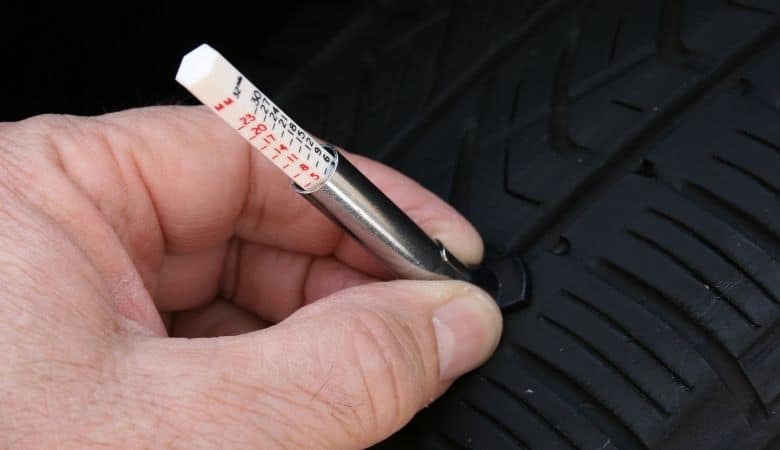
Low tread depth makes it harder to absorb small bumps on the road, causing them to vibrate and make noise. Make sure your tread depth is at least 2/32 of an inch deep. You can find this out using the famous penny test that I explain in this post.
When in doubt, consult with a tire specialist near you or take your car into an auto shop. Additionally, paying attention to proper pressure (particularly when setting up winter driving conditions) can help keep your tread healthy.
5. Nail Puncture Or Leaky Valve Stem
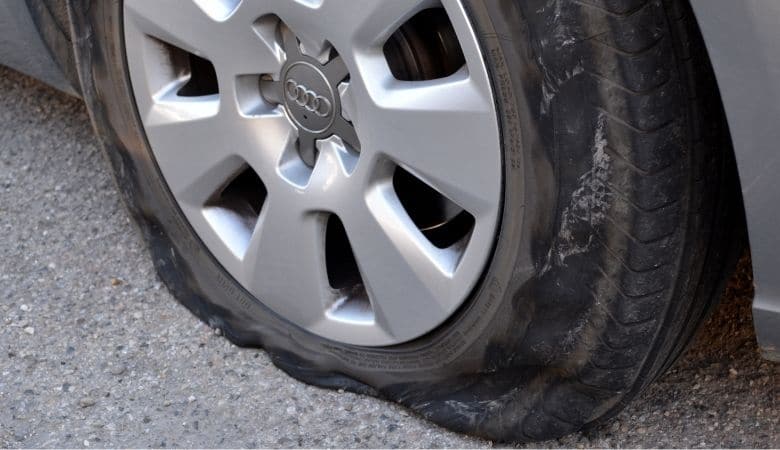
Nail punctures and leaky valve stems are common causes of tire noise. Driving on either a nail or a leaky valve stem can cause air to escape from your tire at high speed, making them both very dangerous.
A nail puncture or leaky valve stem should be addressed immediately to prevent further damage to your tire, car, and yourself. You should also have any items near your car that could potentially fall off (i.e., loose items on top of your car) inspected by an expert to make sure they’re properly attached.
Some sounds you may hear when driving can be caused by loose items coming loose while you drive down the road. If you think it’s possible there is something about your vehicle that is causing it to make a strange sound, bring it in for service as soon as possible.
Your mechanic will inspect all your tires to find out if there is anything wrong with them and let you know if there are other things about your vehicle causing it not to run properly.
6. Improper Tire Balance
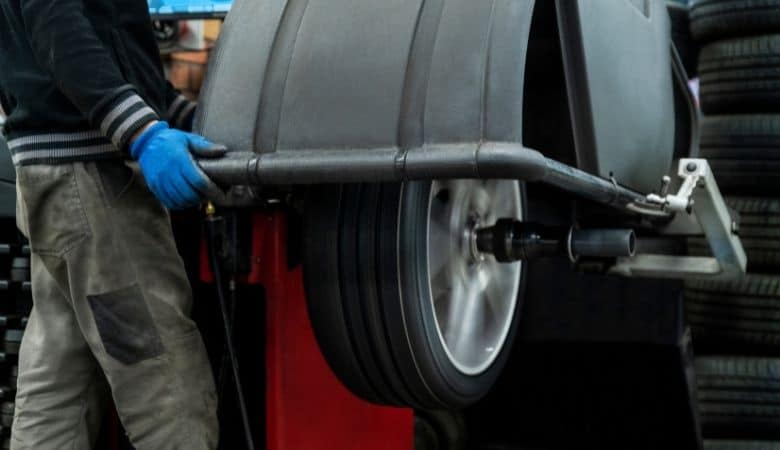
Improperly balanced wheels can be one of several factors that cause noise. When a wheel is not perfectly balanced, it may affect how it spins and ultimately lead to irregular wear of your tire and increased road noise.
It is recommended to bring your vehicle in for periodic wheel balance checks to ensure everything is running smoothly. The technician will inspect your entire wheel assembly, using a computer-controlled balancer to adjust weights and ensure they are evenly distributed around each wheel’s rim.
7. Road Hazard Stuck Between Treads
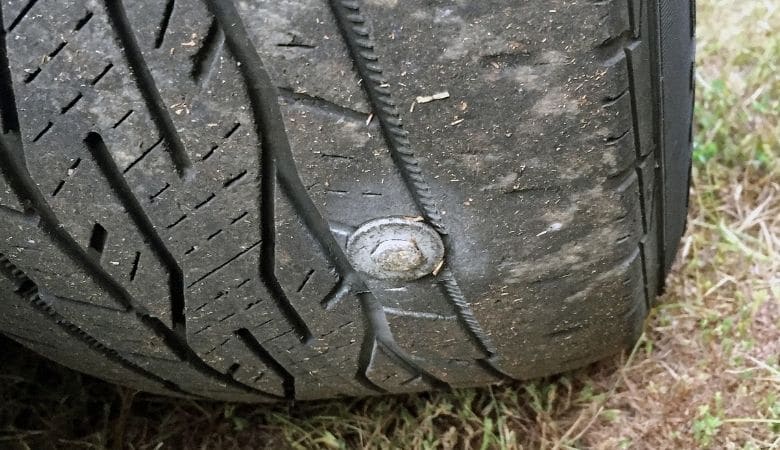
Rubber is one of the most versatile materials known to man, but it’s also subject to wear and tear—and once a road hazard has lodged itself in between treads, you’re likely looking at a trip to your local tire repair shop.
Fixing a puncture on your own is possible if you have time, some spare rubber, and an air compressor (or air tank), but chances are it will cost more than $100 to fix. If that’s too much to swallow (literally) or time-consuming, go ahead and take it into your local shop.
They should be able to diagnose any foreign objects stuck in your treads with an X-ray machine—and they can usually remove whatever they find within minutes. They may charge by the hour; however, if all they need to do is extract something from between your treads and reset your tires pressure level, it might not cost very much at all.
Additionally, make sure that before you drive anywhere afterward, you rotate your wheels correctly. You don’t want them grinding against any hidden chunks of metal while moving forward. And finally, try keeping your tires inflated properly. Road hazards often start small and over-inflated wheels could leave room for further damage.
8. Excessively Worn Out Tires
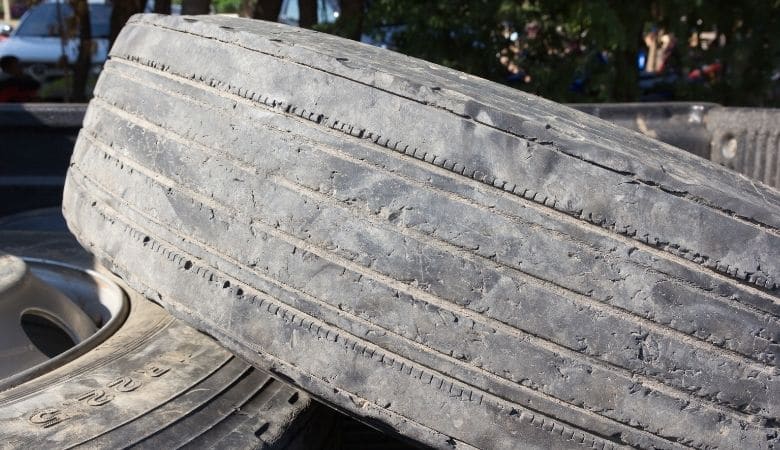
Over time, a tire’s tread can wear down to where it is almost smooth. This can lead to vibrations and other issues, making your car noisy.
Look closely at your tires; if they are not in good shape and need replacing, it may help resolve any issues with them making noise.
If you do find that you do need new tires, then make sure you schedule an appointment with your local auto shop. They should be able to replace your tires quickly and efficiently so that your next trip won’t be as noisy.
Also, don’t forget to replace both of your front tires when you replace just one – otherwise, you could cause oversteer or understeer.
Make sure everything is aligned properly before hitting the road again. You don’t want to wind up getting pulled over because of mismatched tires or improper vehicle alignment.
The last thing anyone wants when driving on long journeys is being pulled over by law enforcement because of their wheels being out of whack. So remember, always pay attention to details like these when driving.
9. Mounted On Rims With High Curb Damage
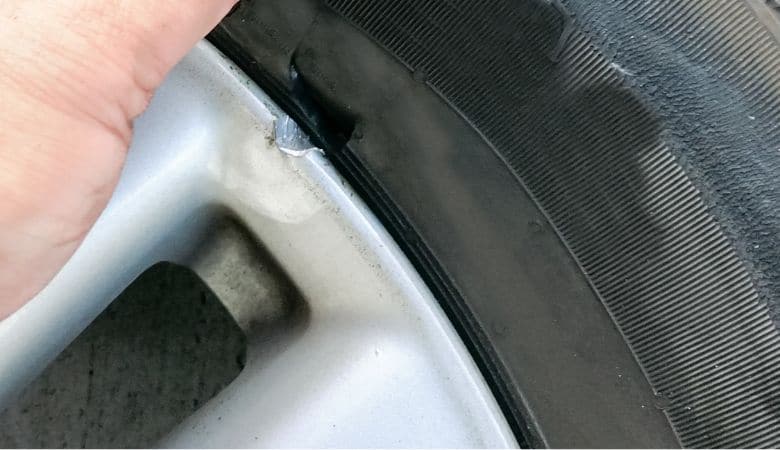
Curb damage occurs when a car is driving over curbs or hitting speed bumps. This is a sign of bad alignment and suspension issues. It can cause uneven wearing on your tires, resulting in excessive noise. Either pay to get that fixed or switch out your rims for ones with less damage, mounted on rims with low curb damage.
Curb damage comes in many different shapes and sizes, but keep an eye out for dents as well as scrapes across your rims’ face. Damage here makes it hard to balance and mount your tire correctly, which increases vibrations inside the tire and can lead to more noise while you drive.
Check first about how much it would cost to replace/fix the rim before you pull them off and find something new. Overinflated tires, when your car is going from point A to point B at 65 miles per hour, one millimeter (1/32 inch) of difference between tire pressure leads to three inches of difference in circumference.
That may not seem like much, but remember how long those two points are; that discrepancy adds up quickly. If you need help measuring tire pressure accurately, buy yourself a set of two dial gauges—one for each front/rear axle—and always check them after filling up at least 15 pounds worth of air into each tire.
10. Incorrect Tire Rotation Pattern
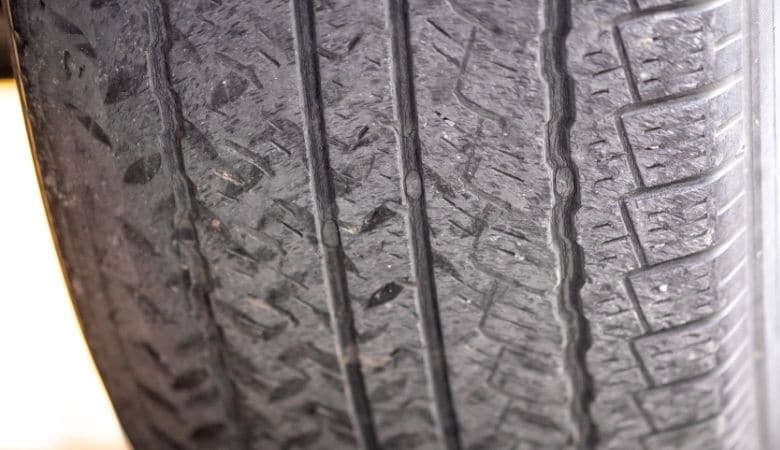
If you didn’t rotate your tires when you should have (every 7,500 to 10,000 miles), you could be dealing with tire wear issues and road noise. When driving your car in an improper rotation pattern, there’s a much higher chance that your tread will experience uneven wear.
A tire wearing improperly can lead to road noise and eventually even damage your car or truck’s suspension system. Make sure to consult your vehicle owner’s manual and follow its recommendations concerning proper rotation patterns.
If you rotate according to manufacturers’ recommendations, chances are very good that you won’t hear any extra noise coming from under your vehicle’s hood. Even if you’re not rotating every oil change, however, it might be wise to at least check things out—many newer vehicles also recommend tire rotation at specified intervals as well.
11. Loose Control Arm Bushings or Shocks
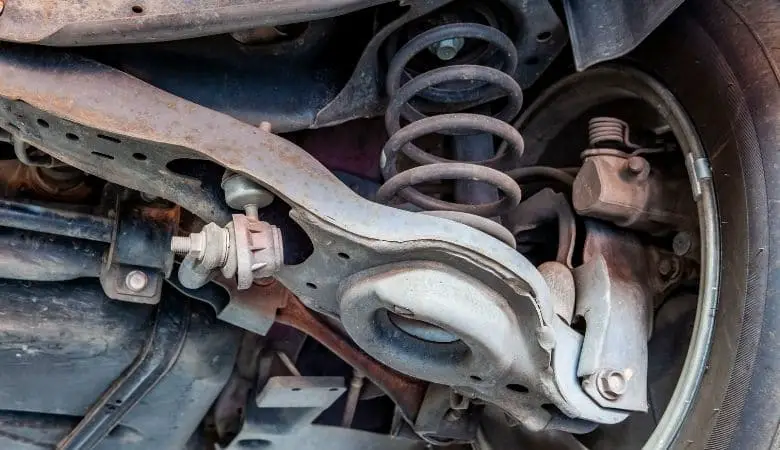
Control arm bushings and shocks may be loose, causing them to vibrate against their mounting points. Not only is that a pretty unpleasant sound for other drivers on the road, but it can also lead to premature wear and damage to your tires.
If your car bounces, rattles, or clunks over bumps and potholes, it could be due to lose control arm bushings or shocks. Replacing these components requires only an hour of work and can save you lots of aggravation.
The easiest way to tell if you have a problem is by driving over high-frequency bumps and potholes at different speeds. If you hear a rattle when going faster (particularly over rough pavement) but not while cruising at slower speeds, there’s a good chance it’s time for new shock absorbers. Loose suspension components are also usually accompanied by torn or cracked rubber bushings.
12. Flapping Inside The Tire
Flapping can occur when the tread separates from a small strip of fabric that keeps it attached to the tire. This strip helps strengthen and stabilize the tire, but if it becomes loose or comes undone, then you’ll hear a flapping sound as you drive.
The flapping occurs because there is nothing to hold on to and prevent your tread from moving around inside your tire. To fix noisy tires caused by flapping, visit an auto repair shop or gas station today. They can apply silicone sealant, which will reattach your treads to your tires and keep them in place. You’ll be able to continue driving safely after only one application.
However, do not let these flaps become large; failing to take care of them promptly could result in more serious problems. Tire store employees should recognize excessive wear-and-tear issues when they look at your tires, so make sure you schedule an appointment right away if these issues persist.
After putting off work for too long, your car may stop being able to go faster than 5 miles per hour—possibly even 3 miles per hour—which means almost any flat terrain becomes dangerous for drivers like yourself. Don’t let unnecessary noise get in between you and safe roads; get things fixed now.
Conclusion
If you’re tired of listening to your tires squeak and squeal, there are a few ways to eliminate the noise. The most obvious fix is to rotate your tires so that they wear evenly; however, if you want a long-term solution, consider buying noise-free tires or investing in new air valves.
In addition, replacing worn treads will also help ensure that your car stays safe. Ultimately, noisy tires are more than just annoying—they can also be dangerous.
Hi, my name is Niklas, the head content creator & CEO of Whirling Wheelz. I am very interested in vehicles of all kinds, mainly cars. I have a car mechanics degree from high school and a big hobby of mine is to follow the WRC (World Rally Championship) both online and through travel.

